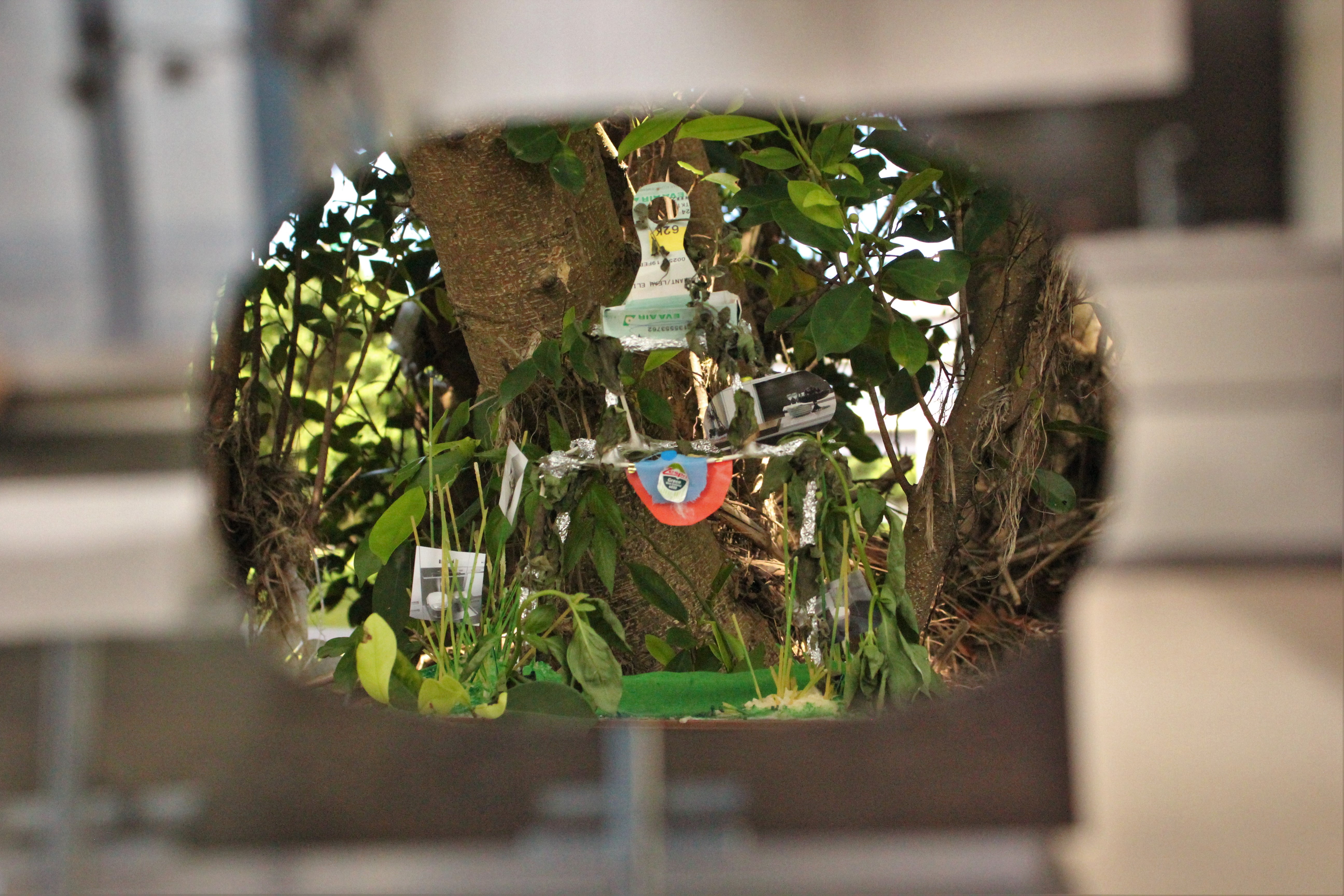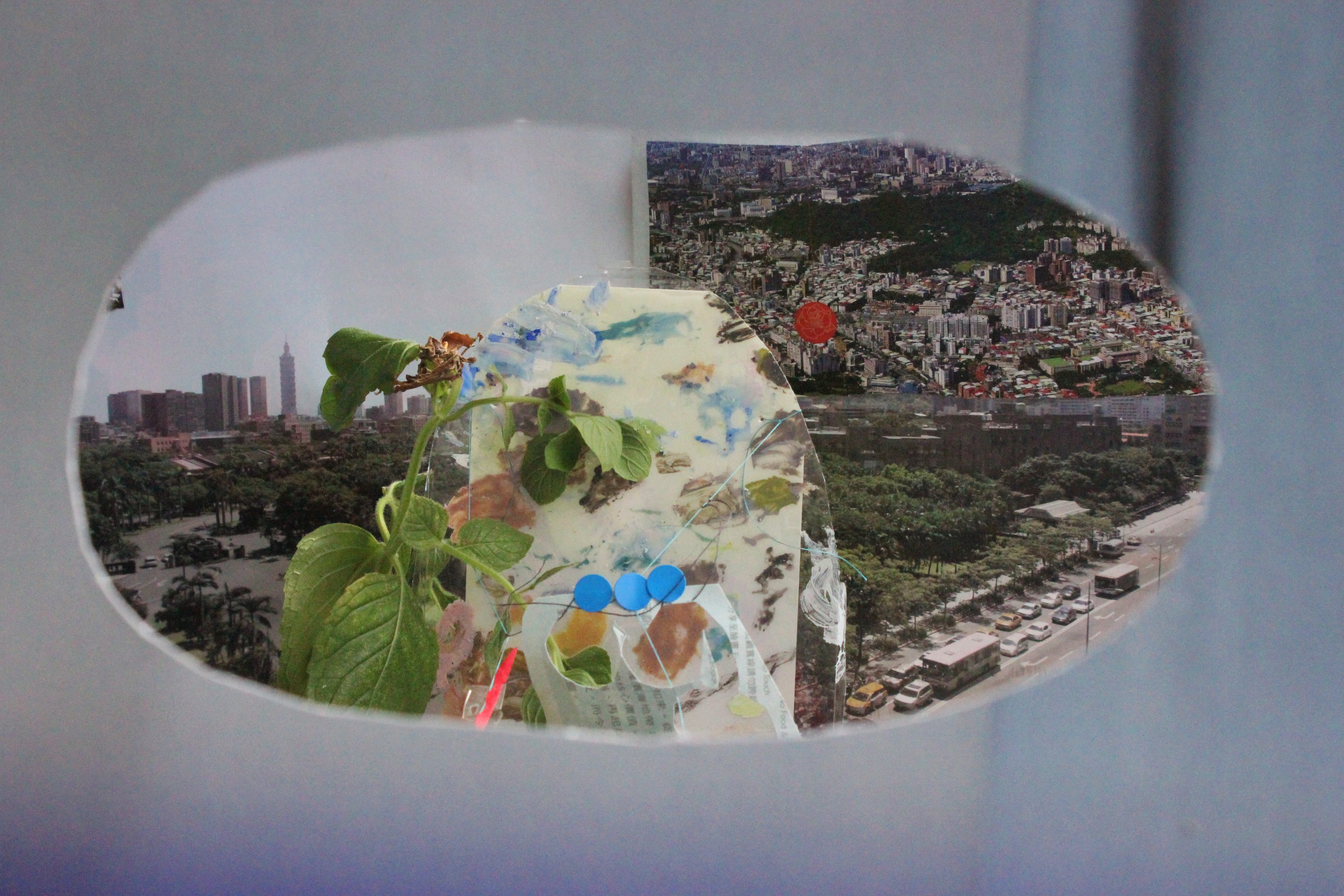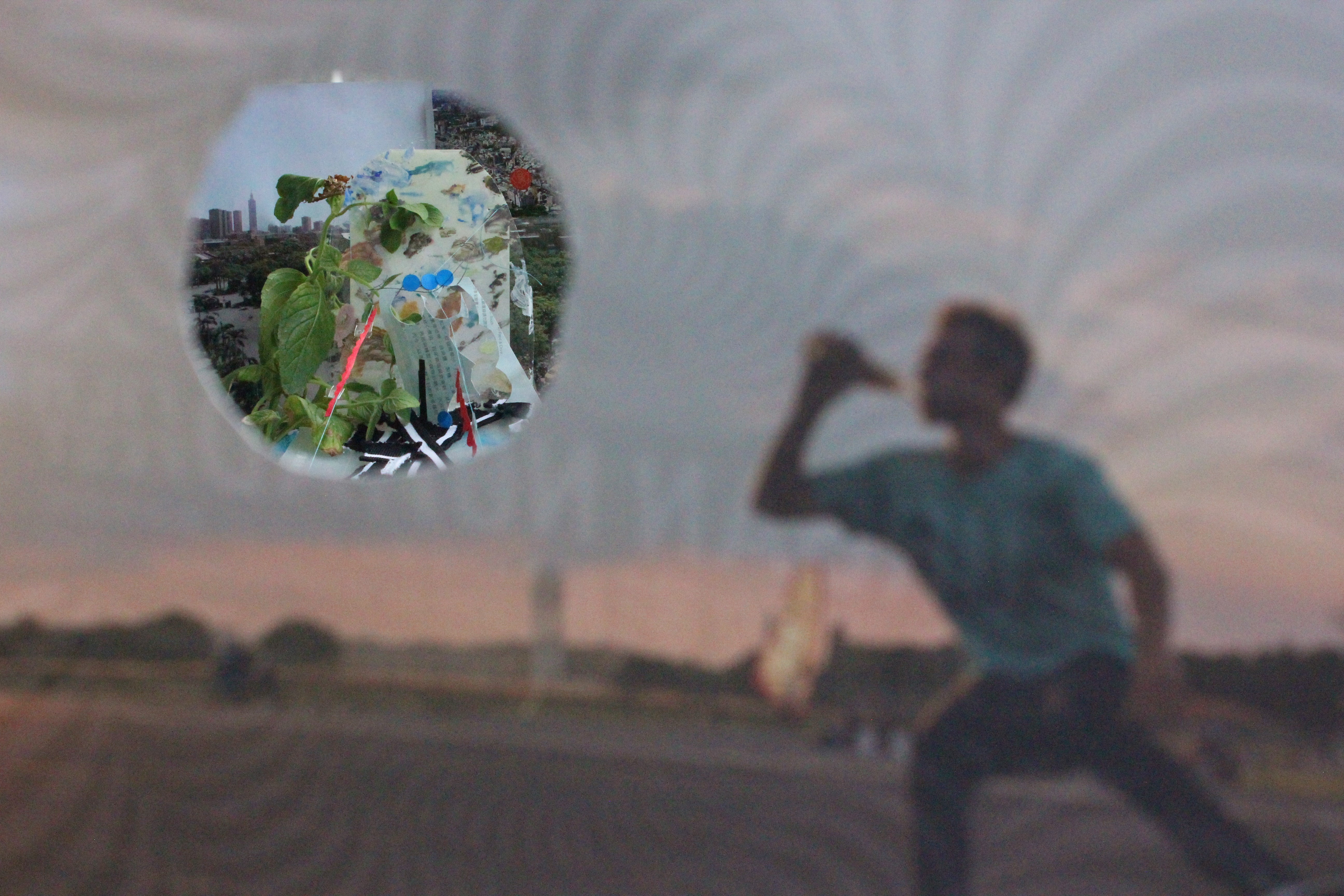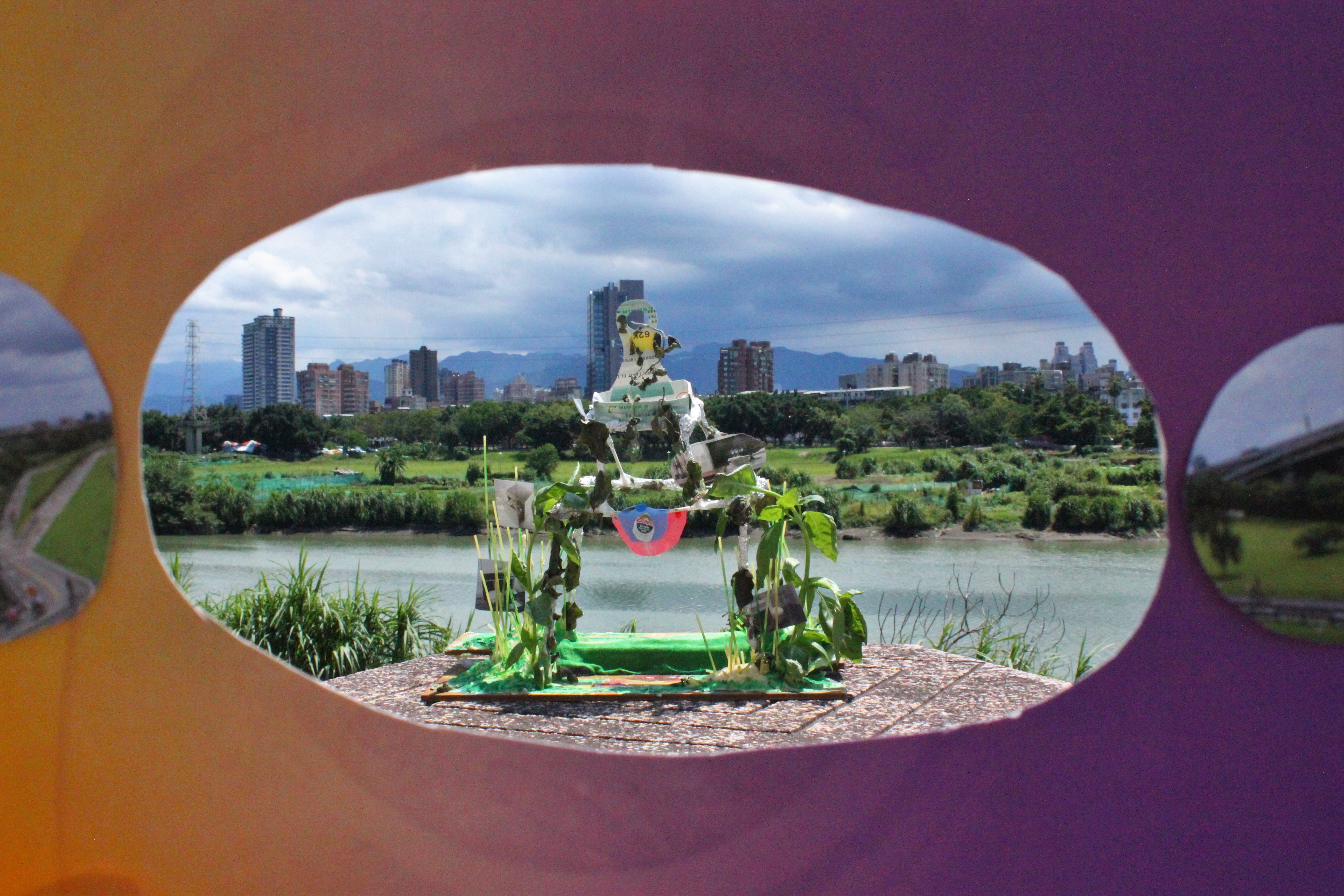Mamie Stevenson
I was told there would be complimentary transcendence
ISSUE 67 | CAMP | AUG 2016


An abrupt change in scenery occurs while heading south and east out of Portland. The lush and multidimensional green so often associated with the Pacific Northwest suddenly evanesces into the dry brown plains that surround canyons and far off snowcapped mountains. In fact, the terrain reminds me of Colorado, my home state and the most beautiful place where I have never done anything outside.
I grew up thinking that there were two types of people: those who camped and those who did not. My parents, both from Pennsylvania, moved to Colorado in the mid eighties when it was “nothing but cows,” as my mother put it and eventually settled down in a suburb about twenty minutes outside of Denver. Our family existed in isolation; all aunts, uncles, cousins lived on either coast, leaving us somewhat estranged in Middle America.

Illustration by Leah Gallant
As a family, we did not ski nor did we explore the natural scenery with which my father fell so deeply in love. If you take two lefts out of my parents’ neighborhood, you will be driving towards the majestic blue Rockies that go on for miles in either direction. The landscape surrounding our family felt like an Ansel Adams photograph in color. Every day, my father gasps while taking in the beauty of those mountains, a beauty he enjoys from the comforts of his air-conditioned vehicle while driving past strip malls and Starbucks that stand caddy-corner to one another. And I am not so different.
My forays into the wild have been few and far between. When I was in first grade, my mother sent me on a school ski trip. It occurred to me almost immediately that I would be terrible at this sport; skiing was for girls named Heather or Casey. My name (always mispronounced and never corrected) was reserved for cows and crotchety aunts that were old enough to witness the advent of the television. The Heathers and Caseys would brag about the various terrains that they had successfully mastered, conjuring images that my young mind could not help but associate with Fraggle Rock—the Black Diamond, the Green Circle. I expected magic, I expected adventure, but what came instead was embittered frustration. When it came time for my lesson, the instructor pointed to my skis and yelled, “Pizza, Mamie! Pizza!” rendering me motionless while salivating. It did not occur to me until later that we were never talking about actual food.
After what seemed like hours of berating the position of my feet, the instructor sent me on a test run and the next thing I remember, I was lost on the slopes for what had to be at least thirty minutes. The panic I felt was only mild due to a newfound sense of purpose and drive to return to the kids and adults who would undoubtedly and anxiously await my return. After wandering around in the harsh winter elements, I finally found my way back, but it was only to the mess hall where my peers sat around a table drinking hot chocolate—completely unaware that I had been missing and that there was not a seat for me. To add insult to injury, there was no pizza.
This would mark the beginning of my self-pity.
When I was thirteen, I went to a Christian camp at the behest of one of my friends who had attended for years. The camp was tucked away just outside of Colorado Springs, small and rustic. Things there felt idyllic and shrouded in religious symbolism—a cross stood erect on the rocks, so high up that we were made to believe a miracle generated its mere existence. And while my atheism was burgeoning by this point, I relished the opportunity to have a week away from my parents and meet boys who had not spent their elementary and middle school careers in my presence, boys who did not witness me peeing my pants in the second grade or attest to the poor fashion statement I made at age nine to wear Velcro sneakers. (I had to convince my classmates for a year that I did, in fact, know how to tie my shoes.)
I had gone to camp hoping to feel liberated and independent, but rather than spend my time trying new things, I sat listless in the cabins, tired from working myself up all night to build up the courage to go and pee in the dark woods. While many of the other kids went on hikes or enjoyed water sports during the day, I isolated myself in the arts and crafts room watching the clock until the next mealtime, feeling starved and martyred (at the time, I was chubby and lethargic due to a strict regimen of Texas Toast and brownie batter among other staples void of nutrition.)
The only thing I did well at camp was talk, and talk loudly. During the required nightly Bible study, I would offer my interpretations of verses to the group—a theology of the desperately adolescent, the Gospel according to a teenage moron. I did not find Jesus at camp, but I discovered what would become a lifelong skill of talking out of my ass. And despite my inward insistence that God wasn’t real, I managed to be awarded for my outstanding participation in Bible study in front of the entire camp on our last night there. I smiled graciously and thanked the lord.
This would mark the beginning of my self-loathing.

Illustration by Leah Gallant
Last year, at twenty-four, I slept outside and in a tent for the very first time. My girlfriend Rachael, her friend Sam, and I found a secluded and pristine area near a creek in Oregon with water so clear and aquamarine that it almost felt like a transgression to be there. It dawned on us immediately upon getting out of the car that our site was immaculate due to its inaccessibility. The trail down to the campground was nearly vertical, causing me to slip and slide down while carrying multiple bags, breaking a French press and scraping my ass bloody in the process. It stung so much that I was able to make it my main excuse to abstain from unloading the rest of the car and instead sit on a collapsible chair while drinking most of the whiskey.
This would mark the beginning, or middle point rather, of my self-righteousness.
It seems that natural settings bring out the worst in me. I have been told that when outside, I complain relentlessly (about bugs, about inclines, about temperature). Moreover, I have an overwhelming and irrational fear of bears that culminated after getting high and watching Grizzly Man in college. I don’t like the unfamiliar and have always thought of myself as more cosmopolitan than country. My idea of “roughing it” stops at cold showers and lack of outlets.
It’s not that I don’t like Mother Nature; I am just certain she doesn’t like me. The relationship I have with her is not unlike the one I have with the sample lady at the uppity market where I buy my groceries. She always smiles—feigning joy—when she sees me enter, but stares at me blankly while I complain about the texture of the soy butter or the alarming softness of the organic cheese puffs that she is giving away for free.
And up until two years ago, I had no reason to go outside for more than a few hours at a time. Then I fell in love with someone who belonged to the camp of camping. Rachael’s family is the kind of family you might imagine to star in a Subaru commercial, or perhaps, more appropriately, a centerfold advertisement for a Chevy Suburban (her family owns two). She and her four siblings grew up with dogs who liked to swim and RVs built for seven, seeking refuge in the Pacific wilderness for at least a week or two every year. She has an uncanny familiarity with all campgrounds within a four hundred-mile radius and is able to recall the location of all McDonald’s off the interstate, and their relative bathroom cleanliness, between here and the Idaho border.
Rachael’s fondest childhood memories happened outside with immediate and extended family alike, grandparents who, unlike mine, were alive—a virtual family reunion of a family who lived no more than twenty minutes away from one another amid the glistening waters of Lake Shasta or the dried and prickling pine trees of Olympic National Park. For this family of pioneers, the four or five days camping make up sacred time, replete with constant togetherness and an otherwise neglected appreciation of the present moment. These feelings are so foreign and unfamiliar to me that their imminence caused me to hyperventilate the night before I went with them on a breezy two-night stint in the woods last summer.
Rest assured, the family wants for nothing when it comes time to camp. In fact, it takes Rachael’s mother Julie the same amount of time to prepare for a camping trip as the trip itself. Every meal is planned; every person’s alcoholic preference is accounted for. She comes with a portable grill and ample propane tanks; there are plastic tubs filled with plastic plates and plastic cups; there is an air mattress or two for each tent that she has provided for every last one of her progeny. Camping with Rachael’s family seems almost identical to spending the evening at her parents’ house—the fire is just more necessary and the bathrooms more public.
And despite the previous night’s anxieties, I was pleasantly surprised at my level of comfort save for unseasonably cold temperatures during the night and warnings from Rachael’s aunt to not eat more than one s’more, which I did against my better judgment, and to the dismay of my colon. (For the record, this fact remains: you will always regret having s’more s’mores.) There was a manageable sense of togetherness and all the whiskey I could hope for.

Illustration by Leah Gallant
This year felt different, though. I was not just with Rachael’s family; rather I was with Rachael’s family and the rest of America. It should come as no surprise that just twenty minutes outside of Portland’s city center, one is confronted with conservatism so unusual in a city that begs its citizens to “keep it weird.” While the idea of the outside always lingers in the forefront of my inexperience, I am always surprised by the sheer nationalism of the West—Manifest Destiny was just a bunch of white people putting their things in other people’s houses.
This dawned on me, once again, an hour into our three-hour car trip (which, in an unfortunate boat-tire blowout, became nine hours) as soon as the radio stations faded into ugly reminders of colonialism. The only music station to come in that was not Christian rock was a strange mix of contemporary pop and oldies. In any one given set on 91.1 KWSO, you might hear Bon Jovi fade into Justin Bieber before playing that overdone Journey ballad (you know the one—“just a city boy…”) The confederated tribes of Warm Springs, Oregon own and operate the station, using it as a community resource, pausing the music for a quarter of an hour to list available jobs in the area and locations for AA chapter meetings.
Switching the dial did not help my white guilt. Just one push of the button away from KWSO was a conservative talk radio station that happened to be airing The Laura Ingraham Show the morning after Laura Ingraham herself spoke at the Republican National Convention. Laura, you might remember, was accused by the goddamn liberal media for giving Donald Trump the heil Hitler after speaking on behalf of the nation regarding his undeniable qualifications to be the president of this here China-hatin’, freedom-havin’, God blessed country of ours. Fuck Ted Cruz! Indict Hillary! Screw political correctness; brutal honesty’s in!
Driving through the small towns, I suddenly felt in the midst of Laura Ingraham’s audience—a demographic of people I often convince myself are a myth—as I read evangelical billboards and recognized multiple confederate flags. It made me wonder why we take ourselves out of what we know best; what is the motivation for taking a vacation from our circumstances?
In my case, I looked forward to a reprieve from the internet, the sense of relief and clarity I might expect from not being constantly inundated by the sound of Donald Trump flapping his lips or accidentally stepping on twelve-year-olds who have stopped in the middle of a crosswalk to play Pokémon Go. Rachael will be the first to tell you that I have not been a particularly pleasant roommate as all I seem to do is sit at home, eyes glazed over, clicking listlessly between sensationalist news articles while putting off my “work” of editing memoirs written by reformed meth addicts who found Jesus.
When venturing out to the backwoods, I expect my own revelation, anticipating some Emersonian transformation of sorts, entitled to the earth and the scenery that was put there for my amusement. I think I have come to think of nature as a privilege, inherently rewarding. And while our camping trip this year was pleasant, the scenery did not boast of utopia. Toxic algae turned the blue lake green and every object at our site became covered with a thick layer of dust. The underwhelming quality of it all reminded me of myself, parched and tired from all the expectation of what could be.
No unattractive part of myself magically vanished from living in the desert for a few days; I was still subject to my humanity. This was evident to me as I sat shitting in a biffy that smelled so foul, my dog refused to go near it. Holding my breath, I realized why I reject nature. When we are away from society, we like to think we are alone and unseen; we like to think civilization doesn’t apply and that our identity as modern humans is rendered obsolete by the mere choice to spend a few days living in the wilderness among the wild. When we become convinced that we are remote and ahistoric, we exclude ourselves from the perils of society, and I can see how that is an appealing way to spend the weekend. However, danger lies in applauding ourselves for being the first to do something.
Looking around the toxic reservoir named for an Indian house made of brush, I was surrounded by the modern relics of the dismantled native land that lay before me—barricaded fire pits and designated shit holes, plastic forks and plastic knives, big cars and motorboats. We have managed to bring our idea of civilization with us wherever we go, fearing that we will find ourselves uncomfortable, or worse yet, bored.

Illustration by Leah Gallant
On Sunday, it took four hours to pack the car with our amenities. Dust hung in the air, clinging onto my clothes with the same persistence as my acrid BO. I remained dirty and unchanged. I turned on my phone and grew excited to see what had happened in the world while I thought I was exploring it. I pondered where I might like to go next, where I really might come upon that feeling one is supposed to have when the beauty of the natural world presupposes the need for the comforts of society, so mundane in their predictability. I thought of Cuba or Rio, but I read someone’s opinion somewhere that they too are about to be tainted places.
We are never the first people to be anywhere anymore, but we never really were. 
The Hypocrite Reader is free, but we publish some of the most fascinating writing on the internet. Our editors are volunteers and, until recently, so were our writers. During the 2020 coronavirus pandemic, we decided we needed to find a way to pay contributors for their work.
Help us pay writers (and our server bills) so we can keep this stuff coming. At that link, you can become a recurring backer on Patreon, where we offer thrilling rewards to our supporters. If you can't swing a monthly donation, you can also make a 1-time donation through our Ko-fi; even a few dollars helps!
The Hypocrite Reader operates without any kind of institutional support, and for the foreseeable future we plan to keep it that way. Your contributions are the only way we are able to keep doing what we do!
And if you'd like to read more of our useful, unexpected content, you can join our mailing list so that you'll hear from us when we publish.
